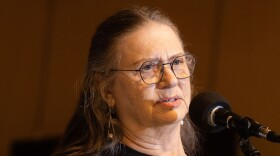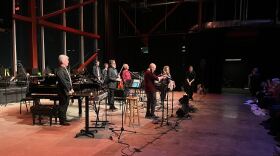The iconic PBS program Firing Line with William F. Buckley ran from 1966 to 1999. The show was known as a platform for debate and discussion for everything from politics to philosophical issues with experts. It was the longest running program with a single host in television history. And with over 1,000 programs in the archive at the Hoover Institution, it has quite the legacy.
Twenty years later, political commentator and analyst Margaret Hoover leads the new reprisal. Firing Line with Margaret Hoover maintains the character of the original show — featuring guests from the left and right sides of debates to have a rigorous and civil exchange of ideas.
"What we are trying to do is riff from something that [Buckley] bequeathed us, which is a long-form exchange of ideas where you can really dive deep into issues of the day that are important to public policy and important to all of our lives," Hoover explains.
While she didn't directly know Buckley, Hoover says she has come to know him very intimately through researching and watching hundreds of his old shows.
"Just watching these old programs, I've gotten such a great sense of Buckley and his wit and his affect and his sense of humor and his quick-mindedness," she says. "I mean, this was the thing that he even gave himself credit for — if he was nothing else, he was quick."
Now that she's leading the helm of Firing Line, Hoover notes she's not trying to be Buckley. "I just think you have to be yourself ... the only way to learn to ride a bike is to start riding a bike," she says.

Today's news and media landscapes have become so quick-paced and crowded that news consumption is full of things that Hoover says are "skin deep."
"There's kernel of wisdom in what Buckley was doing that we've kind of forgotten, and it's just take a moment to have a long-form exchange of ideas — by the way with people that we don't always agree with," she notes. "Because that contest of ideas provides for a far more rich and nuanced approach to issues. I think that's what we recognize, especially at a national level, we're all deeply missing."
The media landscape is one thing that has drastically changed since Buckley's time hosting the show, notes Hoover. "I think we've also created, frankly, a cycle of partisan media that is perpetuated by the profit margin," she says.
"I think we've also created, frankly, a cycle of partisan media that is perpetuated by the profit margin."
According to Hoover, the partisan media combined with partisan politics "perpetuates this sort of tearing apart of our civic discourse. And that’s why what we do at Firing Line can only be on PBS, in a way."
Hoover has interviewed Cindy and Meghan McCain, Bill Nye, Michael Bloomberg, Chelsea Handler, and more. Hoover says she chooses the topics and guests according to the issues she's most interested in. But it also comes down to simply connecting with people.
"I'm interested in people and who they are and what motivates them and why they're sitting in front of me ... and what's gotten them to that point. So, I've done a lot of research into [the guests] personally," notes Hoover.
"The partisan media combined with partisan politics perpetuates this sort of tearing apart of our civic discourse."
She worked in Republican politics in the House of Representatives and the Executive Branch. Hoover is currently a political commentator and analyst for CNN, but she hasn't felt like a journalist until becoming the host of Firing Line. She admits that it's challenging to be a part of "the media" that's often vilified.
"I have a very difficult time with the right ... suddenly having a problem with the First Amendment or blaming the media for the problems that its party has come into," says Hoover. "It doesn't sit well with me. And it points to this problem of hyper-polarized, hyper-partisan media [that] is not serving our country well."
In addition to following the legacy of the original Firing Line, Hoover has always upheld the legacy of her own family history as the great-granddaughter of President Herbert Hoover.
"I love talking about Herbert Hoover more than almost anything! Maybe even more than my small children," jokes Margaret Hoover.
Growing up, she says her friends thought her family history was something she should have been embarrassed by. But Margaret Hoover has always known the man beyond his association with the Great Depression.
READ: New Biography Takes A Look At Herbert Hoover's Life Beyond The Great Depression
https://www.youtube.com/watch?v=DEszplKAlV4
Margaret Hoover says her great-grandfather's story — an orphan boy from a frontier town rising to great success — is truly American. Herbert Hoover was a self-made mining engineer. He organized the first international humanitarian food campaign to save Belgium from starvation during World War I. This entity became the template for UNICEF, according to Margaret Hoover.
"I'm so energized by Hoover's example ... He was a technologist, he was a person of the world, he was a problem solver, and he was a civil servant. And his example is an example I think that's so tangible right now," she says.






